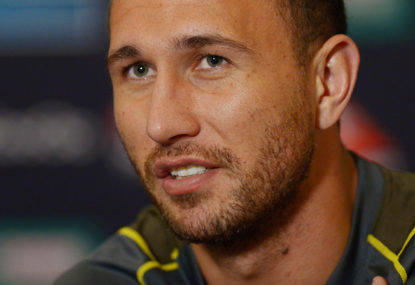The England versus Australia match overnight was a cracker for a number of reasons. Neither country enjoys losing to the other at any point, but less than a year out from the World Cup, England took an important moral victory and were deserved winners.
Australia also finished with a 1-3 record for the Spring Tour.
However, as a Wallabies supporter, I’m actually not that bothered and I’ll explain why. I feel we have more to gain by losing that match.
Michael Cheika will take a look at the stats from the England match and surely learn an important lesson. If you looked at some of the stats alone, you would assume Australia won by a fair margin: 66 per cent possession, 70 per cent time in opposition half, 559 metres run against England’s 169, 7 missed tackles to England’s 25.
The previous week, similar trends emerged from the Ireland game, albeit not as lopsided. Yet the teams on the wrong side of the stats board finished ahead on the most important stat – points scored.
The narrative of the game played out exactly like the Ireland game as well. England played to their strengths – or you could say played to our glaring forward pack deficiency – and kicked with much more purpose and accuracy.
Like Ireland, they weren’t interested in rumbling up the field, phase after phase like Australia does, and does well. They enlist their smart and accurate kickers, who constantly put Australia under pressure. So although their run metres were dwarfed by Australia’s, if there was a metric for tactical kicking effectiveness, it would be no contest, England by a country mile.
I stated that I’m not too disappointed by the loss. I feel this because I know Michael Cheika is a smart man, and he will realise England sucker punched Australia by playing simple and effective Test rugby.
Cheika now has a bit of time to realise this and tweak his tactics a little.
I am all for retaining the style of rugby that Cheika set up with the Waratahs – I think all who watched the game would agree that Australia were far more dangerous with the pill in hand – and this is a key asset we need to build our game around.
However there is room for more variety in our game plan, and that means being better at the boring but effective tactical kicking department.
In my opinion, Quade Cooper has shown the most promise in that area. I feel he is more likely to find space and make territory. Not only that, he also appears sharper, fitter and more mature with ball in hand than previously.
How to fit him in is the harder question. I felt the decision to sub Cooper in early was a good one, despite Bernard Foley starting to find cracks in the defence. It’s unfair to stick a player of his style in with only 10 minutes left and expect them to go ahead and change the result.
Looking ahead to the World Cup and stating the obvious, somehow we need to bolster our pack because giving away so many scrum penalties is unacceptable. I don’t have the answer, but I’m not the scrum coach either.
Australia now has an opportunity for Cheika to actually take a breath and apply the lessons learnt from the tour. I am also sure he will counsel Michael Hooper on some of the finer points of decision making.
I am a huge Hooper fan. His engine is massive, and you can’t fault what he brings to the team as a player, leading by example. However, his captaincy can do with some refinement
For example, Australia had a penalty in the final minute.
The ball should have been hurled at Foley for an attempt at drop goal, which may have given Australia just enough time to receive a kick off, and who knows, make their way up the field for a try.
Low percentage play? Definitely. But better than the 0 per cent play of tap and go, which at best, could only result in seven points and guaranteed full time. That decision was just a snippet of where Hooper can improve.
Taking points on offer is the other area. Hooper has shown confidence in his team by electing to kick for touch when kickable penalties are awarded.
But consider this. Using a probability that Foley kicks at around 75 per cent, the expected average return on penalty attempts is therefore three points x 75 per cent, which is 2.25 points per attempt.
To achieve the same average result, Australia needs to score a try approximately a third of the time (6.5 points per try x 33 per cent = 2.17 points).
This just isn’t happening. Chuck the ball to Foley and build some pressure on the scoreboard. Surely we learnt that from the All Blacks Test in Sydney?
So despite a superficially poor record, Australia have shown enterprise and danger and have plenty of tweaks that can be easily changed. And if someone can check that the forward pack have studs on their boots, we’re a dead certainty!





























































































